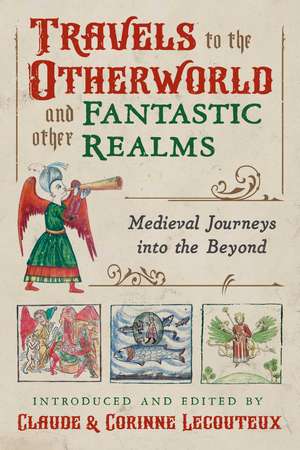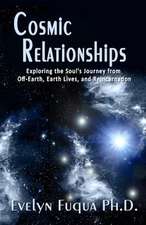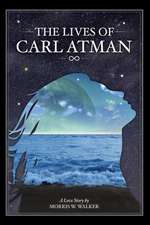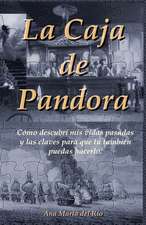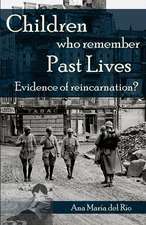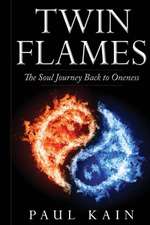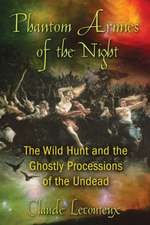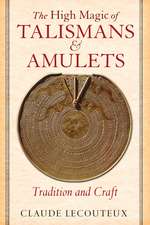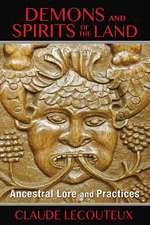Travels to the Otherworld and Other Fantastic Realms: Medieval Journeys into the Beyond
Editat de Claude Lecouteux, Corinne Lecouteuxen Limba Engleză Hardback – 17 sep 2020
• Shares travelers’ accounts of voyages into the afterlife, alarming creatures of unparalleled strangeness, encounters with doppelgangers and angels, chivalric romantic misadventures, and legends of heroes
• Explains how travelers’ tales from the Middle Ages drew on geographies, encyclopedias, travel accounts, bestiaries, and herbals for material to capture the imagination of their audiences
• Includes rare illustrations from incunabula and medieval manuscripts
Heading off to discover unknown lands was always a risky undertaking during the Middle Ages due to the countless dangers lying in wait for the traveler--if we can believe what the written accounts tell us. In the medieval age of intercontinental exploration, tales of sea monsters, strange hybrid beasts, trickster faeries, accidental trips to the afterlife, and peoples as fantastic and dangerous as the lands they inhabited abounded.
In this curated collection of medieval travelers’ tales, editors Claude and Corinne Lecouteux explain how the Middle Ages were a melting pot of narrative traditions from the four corners of the then-known world. Tales from this period often drew on geographies, encyclopedias, travel accounts, bestiaries, and herbals for material to capture the imagination of their audiences, who were fascinated by the wonders being discovered by explorers of the time.
Accompanied by rare illustrations from incunabula and medieval manuscripts, the stories in this collection include voyages into the afterlife, with guided tours of Hell and glimpses of Heaven, as well as journeys into other fantastic realms, such as the pagan land of the Faery. It also includes accounts from travelers such as Alexander the Great of alarming creatures of unparalleled strangeness, encounters with doppelgangers and angels, legends of heroes, and tales of chivalric romantic misadventures, with protagonists swept to exotic new places by fate or by quest. In each story, the marvelous is omnipresent, and each portrays the reactions of the protagonist when faced with the unknown.
Offering an introduction to the medieval imaginings of a wondrous universe, these tales reflect the dreams and beliefs of the Middle Ages’ era of discovery and allow readers to survey mythic geography, meet people from the far ends of the earth, and experience the supernatural.
Preț: 126.95 lei
Preț vechi: 181.25 lei
-30% Nou
Puncte Express: 190
Preț estimativ în valută:
24.29€ • 25.43$ • 20.10£
24.29€ • 25.43$ • 20.10£
Carte disponibilă
Livrare economică 21 martie-02 aprilie
Livrare express 04-08 martie pentru 87.20 lei
Preluare comenzi: 021 569.72.76
Specificații
ISBN-13: 9781620559420
ISBN-10: 1620559420
Pagini: 240
Ilustrații: 105 b&w illustrations
Dimensiuni: 152 x 229 x 23 mm
Greutate: 0.52 kg
Editura: Inner Traditions/Bear & Company
Colecția Inner Traditions
ISBN-10: 1620559420
Pagini: 240
Ilustrații: 105 b&w illustrations
Dimensiuni: 152 x 229 x 23 mm
Greutate: 0.52 kg
Editura: Inner Traditions/Bear & Company
Colecția Inner Traditions
Notă biografică
Claude Lecouteux is a professor emeritus of medieval literature and civilization at the Sorbonne. He is the author of numerous books on medieval beliefs and magic, including The Book of Grimoires and Dictionary of Ancient Magic Words and Spells. Corinne Lecouteux is a translator specializing in tales and legends. They live in Paris.
Extras
Chapter One. Journeys to the Borderlands
1. Alexander’s Letter to Olympia (Greek)
After he had defeated Darius and conquered the kingdoms of Ariobarzanes and Manazakes, subjugated the Medie, Armenia, and the whole of Persia, Alexander set off toward the north. King Alexander sends his greetings to his very dear mother and to his teacher Aristotle I brought guides because I wished to push toward the Big Dipper through the deserts. They advised me against this course because of the wild beasts living there, but I ignored them. We came to a region with many ravines, where the path was narrow and steep-sided and for eight days we came across strange and unknown animals.
We finally entered a large forest of trees called anaphanta, which produced a most peculiar fruit: enormous apples as large as gourds. The inhabitants, the Phytoi, a people some twenty-four ells in height, had horns that were around one and one half ell and had long feet. But their forearms were saws. When they caught sight of us, they rushed to meet us. Horrified at the sight of them, I commanded that one be captured. When we attacked them while shouting and blowing the trumpets, they fled. We killed thirty-two of them while one hundred of our soldiers were slain. We remained there for a time to eat the fruits of the anaphanta.
We resumed our journey in a dreary land inhabited by people like giants, who were massive and ruddy like lions. Near them lived the Ochlites, bald men about four ells in height and wide as a spear. They wore lion hides and were quite skilled fighters. We attacked them but they slew many of us with their clubs. I grew scared and commanded that the forest be set alight. They turned tail once they saw the flames, but only after they had already killed one hundred eighty soldiers.
The next day I decided to visit their caves. We found wild beasts who had three eyes and resembled lions chained in front of the gates there. We could see fleas the size of frogs jumping around. We resumed our journey and found a spring near to which I ordered our tents to be set up. We stayed in this place for two months.
We then headed off again and arrived at the land of the Melophagi. We reached a river and called a halt. There were trees in the water there that grew from dawn to noon, then shrunk away to nothing. Their resin was similar to Persian myrrh and smelled wonderful. I ordered some to be cut down so that their resin could be collected with sponges, but my men were whipped by invisible beings when they tried to do so. We could hear the blows and see their victims fall onto their backs, but those holding the whips did not show themselves. A voice then rang out, forbidding us to cut down the trees and to collect their sap. “Stop, otherwise your entire army will be struck dumb.” I therefore obeyed this command.
We also found black stones in this river: anyone who grabbed hold of one would turn black. There were also reptiles and all kinds of fish that were not cooked by fire, but by cold spring water. We learned this when a soldier washed a fish in the spring, put it in a container and saw that it was cooked. There were also birds similar to the birds of our lands living next to the river, but they breathed out flames when they were grabbed.
We resumed our journey the next day. Our guides told us: “We do not know where we are going. We should turn around in order to avoid entering even more inhospitable regions,” but I refused. We encountered many different animals, some with six paws, some with three or five eyes, some who were six ells long, and many others as well. Some of them fled when we came across them, others attacked us.
We then made our way into a sandy country that was inhabited by peaceful beasts resembling wild asses. They were twenty ells long and had six eyes, but could only see with two of them. The soldiers slew several with their bows.
We then arrived at the land of the headless men, who did however possess human speech. They went fishing--their sole food was fish--and brought us some. They were hairy and clothed in animal hides. Some of them gave us mushrooms that weighed twenty-five pounds each. We also saw a countless number of seals crawling on the shore. Our friends invited us to return, which I had no desire to do at all, as I wished to see the ends of the earth.
We continued our advance to the sea and no longer saw any birds or animals. All we could see were the earth and sky, not even the sun; we were completely swallowed by shadow. We raised camp at the water’s edge for several days. An island could be seen in the middle of the sea, which I wanted to explore. I had a large number of small boats constructed and some thousand men set sail to make the crossing. We could hear human voices coming from the island proclaiming in Greek: “O son of Philipp, child of Egypt, your name is already herald of your great deeds: your mother named you Alexander and you have turned back and defeated men and driven kings from their kingdoms, but you will soon be in sore need of soldiers when Lambda, the second letter of your name, has been fulfilled.” We could not see a soul. Several careless soldiers swam to the island to search it for treasure, but the rest of us returned to the campground in fear.
1. Alexander’s Letter to Olympia (Greek)
After he had defeated Darius and conquered the kingdoms of Ariobarzanes and Manazakes, subjugated the Medie, Armenia, and the whole of Persia, Alexander set off toward the north. King Alexander sends his greetings to his very dear mother and to his teacher Aristotle I brought guides because I wished to push toward the Big Dipper through the deserts. They advised me against this course because of the wild beasts living there, but I ignored them. We came to a region with many ravines, where the path was narrow and steep-sided and for eight days we came across strange and unknown animals.
We finally entered a large forest of trees called anaphanta, which produced a most peculiar fruit: enormous apples as large as gourds. The inhabitants, the Phytoi, a people some twenty-four ells in height, had horns that were around one and one half ell and had long feet. But their forearms were saws. When they caught sight of us, they rushed to meet us. Horrified at the sight of them, I commanded that one be captured. When we attacked them while shouting and blowing the trumpets, they fled. We killed thirty-two of them while one hundred of our soldiers were slain. We remained there for a time to eat the fruits of the anaphanta.
We resumed our journey in a dreary land inhabited by people like giants, who were massive and ruddy like lions. Near them lived the Ochlites, bald men about four ells in height and wide as a spear. They wore lion hides and were quite skilled fighters. We attacked them but they slew many of us with their clubs. I grew scared and commanded that the forest be set alight. They turned tail once they saw the flames, but only after they had already killed one hundred eighty soldiers.
The next day I decided to visit their caves. We found wild beasts who had three eyes and resembled lions chained in front of the gates there. We could see fleas the size of frogs jumping around. We resumed our journey and found a spring near to which I ordered our tents to be set up. We stayed in this place for two months.
We then headed off again and arrived at the land of the Melophagi. We reached a river and called a halt. There were trees in the water there that grew from dawn to noon, then shrunk away to nothing. Their resin was similar to Persian myrrh and smelled wonderful. I ordered some to be cut down so that their resin could be collected with sponges, but my men were whipped by invisible beings when they tried to do so. We could hear the blows and see their victims fall onto their backs, but those holding the whips did not show themselves. A voice then rang out, forbidding us to cut down the trees and to collect their sap. “Stop, otherwise your entire army will be struck dumb.” I therefore obeyed this command.
We also found black stones in this river: anyone who grabbed hold of one would turn black. There were also reptiles and all kinds of fish that were not cooked by fire, but by cold spring water. We learned this when a soldier washed a fish in the spring, put it in a container and saw that it was cooked. There were also birds similar to the birds of our lands living next to the river, but they breathed out flames when they were grabbed.
We resumed our journey the next day. Our guides told us: “We do not know where we are going. We should turn around in order to avoid entering even more inhospitable regions,” but I refused. We encountered many different animals, some with six paws, some with three or five eyes, some who were six ells long, and many others as well. Some of them fled when we came across them, others attacked us.
We then made our way into a sandy country that was inhabited by peaceful beasts resembling wild asses. They were twenty ells long and had six eyes, but could only see with two of them. The soldiers slew several with their bows.
We then arrived at the land of the headless men, who did however possess human speech. They went fishing--their sole food was fish--and brought us some. They were hairy and clothed in animal hides. Some of them gave us mushrooms that weighed twenty-five pounds each. We also saw a countless number of seals crawling on the shore. Our friends invited us to return, which I had no desire to do at all, as I wished to see the ends of the earth.
We continued our advance to the sea and no longer saw any birds or animals. All we could see were the earth and sky, not even the sun; we were completely swallowed by shadow. We raised camp at the water’s edge for several days. An island could be seen in the middle of the sea, which I wanted to explore. I had a large number of small boats constructed and some thousand men set sail to make the crossing. We could hear human voices coming from the island proclaiming in Greek: “O son of Philipp, child of Egypt, your name is already herald of your great deeds: your mother named you Alexander and you have turned back and defeated men and driven kings from their kingdoms, but you will soon be in sore need of soldiers when Lambda, the second letter of your name, has been fulfilled.” We could not see a soul. Several careless soldiers swam to the island to search it for treasure, but the rest of us returned to the campground in fear.
Cuprins
Introduction
Between the Worlds
PART ONE
Extraordinary Journeys
One
Journeys to the Borderlands
1. Alexander’s Letter to Olympias (Greek)
2. Dhul-Qarnayn’s Entry into Darkness near the North Pole in Search of the Spring of Life (Medieval Arabic)
3. Alexander’s Letter to Aristotle (Latin)
4. The Adventures of Alexander in Images
Two
Journeys to the Otherworld
1. The Prince in Paradise (Latin)
2. Tundale the Knight (Low German)
3. Guests of the Devil (Latin)
Three
Travels in the Land of Faery
1. Thomas of Erceldoune (Modern Scots)
2. The Song of Tannhäuser (Low German)
3. The Tannhäuser of the Brothers Grimm (Modern German)
4. Guerrin Meschino at the Home of the Fairy Alcina (Italian)
PART TWO
Romances of Adventure
Four
Duke Ernst (Middle High German)
1. How They Arrived in the Land of Grippia
2. The Magnetic Mountain
Five
Solomon and Marcolf (Middle High German)
Six
Solomon and Marcolf: The Chapbook Illustrations
Seven
Štilfríd and Bruncvík (Old Czech)
By Way of Conclusion
The Priest Amis, an Adventurer (Middle High German)
1. The Invisible Fresco
2. Priest Amis the Doctor
Notes
Bibliography
Folk Motifs in the Tales and Legends
Index
Between the Worlds
PART ONE
Extraordinary Journeys
One
Journeys to the Borderlands
1. Alexander’s Letter to Olympias (Greek)
2. Dhul-Qarnayn’s Entry into Darkness near the North Pole in Search of the Spring of Life (Medieval Arabic)
3. Alexander’s Letter to Aristotle (Latin)
4. The Adventures of Alexander in Images
Two
Journeys to the Otherworld
1. The Prince in Paradise (Latin)
2. Tundale the Knight (Low German)
3. Guests of the Devil (Latin)
Three
Travels in the Land of Faery
1. Thomas of Erceldoune (Modern Scots)
2. The Song of Tannhäuser (Low German)
3. The Tannhäuser of the Brothers Grimm (Modern German)
4. Guerrin Meschino at the Home of the Fairy Alcina (Italian)
PART TWO
Romances of Adventure
Four
Duke Ernst (Middle High German)
1. How They Arrived in the Land of Grippia
2. The Magnetic Mountain
Five
Solomon and Marcolf (Middle High German)
Six
Solomon and Marcolf: The Chapbook Illustrations
Seven
Štilfríd and Bruncvík (Old Czech)
By Way of Conclusion
The Priest Amis, an Adventurer (Middle High German)
1. The Invisible Fresco
2. Priest Amis the Doctor
Notes
Bibliography
Folk Motifs in the Tales and Legends
Index
Recenzii
“Through Travels to the Otherworld and Other Fantastic Realms, Claude and Corinne Lecouteux bring forward mythical narratives of our medieval ancestors as rich, tangible cosmologies for us to peer into. Just as these extraordinary heroes and creatures come alive in this collection, so does the Lecouteuxs’ passion for sharing them.”
“The authors provide a succinct and readable compendium of unexpected journeys from this world to those which lie just beyond our ordinary human experience, as recounted in several ancient and medieval sources: Greek, Latin, Arabic, Scots, Old Czech, and Middle High German. Some of these unknown lands are deep within the forest or over the horizon; others are above or below or within our terrestrial world--a parallel universe in a different dimension of space and time altogether but not inaccessible to bold adventurers or curious readers who often discover their real selves in these imagined realms.”
“Claude Lecouteux is the most versatile and wide-ranging of the scholars of the medieval imagination, and any book of his is a treat. Here, he and Corinne have given us both a good resource and great entertainment.”
“In a time when many traditional themes are trivialized, overdramatized, or, conversely, rendered bland for entertainment on film and television, here is a collection of timeless stories and legends from ancient texts, myth, and folklore, as they were presented to readers in the Middle Ages. I found this collection to be inspiring, well-chosen, and skillfully presented.”
“Travels to the Otherworld and Other the Fantastic Realms presents tales of traveling to the end of the Earth, traversing the globe in the name of love and/or vengeance, seeing the fires of Hell, and more! Along with these stories are rare illustrations from manuscripts and chapbooks. If you want to voyage to ancient, magical places, Travels to the Otherworld and Other Fantastic Realms by Claude and Corinne Lecouteux is a beautiful resource."
"Magnetic mountains, topless fairies, monster frogs of varied colours – what’s not to like in this collection of mediæval adventure stories? Claude and Corinne Lecouteux have collected tales in languages from Greek to Czech about heroes who step off the edge of ordinary reality and pass through strange worlds. Some are actual journeys out of the map, others venture into an uncanny fairy realm, while the Irish knight Tundal lies motionless between life and death while his soul travels through the afterlife. Bit of a mixed bag, then."
“The authors provide a succinct and readable compendium of unexpected journeys from this world to those which lie just beyond our ordinary human experience, as recounted in several ancient and medieval sources: Greek, Latin, Arabic, Scots, Old Czech, and Middle High German. Some of these unknown lands are deep within the forest or over the horizon; others are above or below or within our terrestrial world--a parallel universe in a different dimension of space and time altogether but not inaccessible to bold adventurers or curious readers who often discover their real selves in these imagined realms.”
“Claude Lecouteux is the most versatile and wide-ranging of the scholars of the medieval imagination, and any book of his is a treat. Here, he and Corinne have given us both a good resource and great entertainment.”
“In a time when many traditional themes are trivialized, overdramatized, or, conversely, rendered bland for entertainment on film and television, here is a collection of timeless stories and legends from ancient texts, myth, and folklore, as they were presented to readers in the Middle Ages. I found this collection to be inspiring, well-chosen, and skillfully presented.”
“Travels to the Otherworld and Other the Fantastic Realms presents tales of traveling to the end of the Earth, traversing the globe in the name of love and/or vengeance, seeing the fires of Hell, and more! Along with these stories are rare illustrations from manuscripts and chapbooks. If you want to voyage to ancient, magical places, Travels to the Otherworld and Other Fantastic Realms by Claude and Corinne Lecouteux is a beautiful resource."
"Magnetic mountains, topless fairies, monster frogs of varied colours – what’s not to like in this collection of mediæval adventure stories? Claude and Corinne Lecouteux have collected tales in languages from Greek to Czech about heroes who step off the edge of ordinary reality and pass through strange worlds. Some are actual journeys out of the map, others venture into an uncanny fairy realm, while the Irish knight Tundal lies motionless between life and death while his soul travels through the afterlife. Bit of a mixed bag, then."
